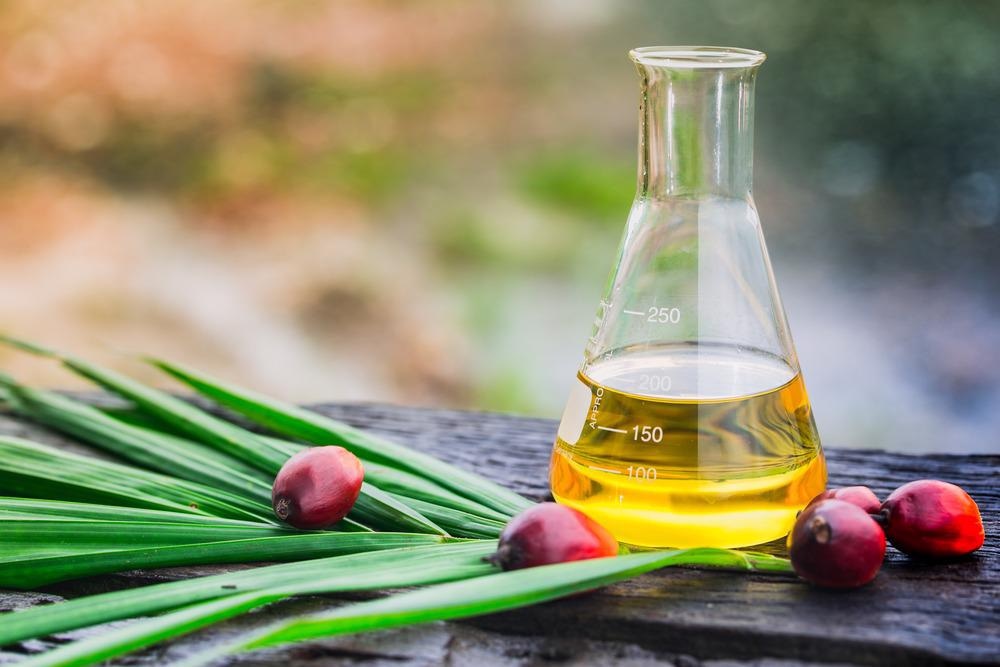
Image Credit: nirapai boonpheng/Shutterstock.com
Palm oil is mainly used as cooking oil in developing countries and as an ingredient in food products, detergents, cosmetics, and biofuels. Palm oil production has long been associated with deforestation in the most biodiverse places on earth. Governments, organizations, and charities have embarked on campaigns to promote alternatives to palm oil, in addition to regulatory enforcement and certifications to ensure a long-term sustainable production of palm oil and ecological protection.
Based in New York, US, C16 Biosciences is a start-up founded in 2017 with a mission to reduce greenhouse gas emissions associated with palm oil production with their lab-grown palm oil alternative.
The product is 20% less expensive to customers and is produced in specialized bioreactors. C16 Biosciences has formed partnerships with end-users, namely several beauty and food distributors, that spend around USD 1.2 billion annually on palm oil.
The Palm Oil Industry in Numbers
Palm oil is one of the world’s most adaptable vegetable oil and is an essential ingredient in more than half of packaged products, including lipsticks, soaps, detergents, bread, and ice creams. It is also part of our clothes and fuels that power our cars.
Sourced exclusively from the tropical region, it is used worldwide. Most experts agree that palm oil market is valued at USD 61 billion annually and is growing consecutively with its associated products' growing global consumption.
Worldwide palm oil production has been increasing gradually for 50 years. Annual production quadrupled from 15.2 million to 62.6 million tons between 1995 and 2015. It is expected to quadruple again by 2050, reaching almost 240 million tons.
Today, three billion people in 150 countries use products containing palm oil. Globally, each person consumes an average of 8 kg of palm oil in one year.
The Significant Environmental Impact of Palm Oil
The environmental impact of palm oil production is significant. To produce palm oil, palm fruits are collected from elaies guneisis trees, which can live for around 28 to 30 years. However, over time the trees grow too high for the fruits to be harvested. At this stage, they are cut down to plant new ones in their place. This vicious cycle further contributes to harmful deforestation.
To make things worse, palm oil trees only grow within 5 to 10 degrees on either side of the equatorial line. In this region, the tropical rainforests are densely rich with flora and fauna biodiversity, which are often packed together in small areas, forming an inherent symbiosis.
The “slash-and-burn” land-clearing activities by palm tree growers over the last few decades to meet the growing demand for palm tree plantations have threatened the existence of these species.
The footprint and environmental costs of palm oil production are undeniably huge. Deforestation accounts for 10% of permanent global cropland. This is in addition to the significant greenhouse gas emissions from the aforementioned slash-and-burn practices carried out to clear the forests. The displaced animal species find it harder to survive with more limited spaces available, often existing side-by-side with the palm plantations.
South East Asia populations are very familiar with the recurrence of thick smoky haze formed by dangerous pollutants associated with palm oil deforestation activities during dry seasons. This affects business operations, schools and recreation as it is unsafe to remain outdoors. Therefore, the impact of palm oil deforestation is also economically detrimental, particularly in the affected regional inhabitants.
The Problem With Palm Oil | Fight for the Forests | TakePart
Video Credit: Take Part/YouTube.com
The Revolutionary C16 Palm Oil Alternative
C16 Biosciences was founded to create an environmentally conscious and sustainable palm oil alternative product to disrupt the current market.
The company offers palm oil production and interrelated consumption parties, such as producers, refiners, traders, and consumers, an opportunity to invest in a sustainable bio-based palm oil alternative. It hopes to reduce palm oil environmental footprint and protect natural land, biodiverse flora and fauna, and the rich tropical bioresources.
By using sustainable and traceable raw materials, the company’s palm oil alternative production uses yeast-fermented microbes in specialized bioreactors to produce oil intracellularly. Essentially, it is akin to the traditional fermentation process that has been employed for centuries.
Fermentation is a traditional, proven, and commercially successful process in converting raw materials into consumable products via enzymes' action. Fermented products are consumed by the billions every day. C16 Biosciences believes that this process is the best alternative for palm oil production in the future. The company’s challenge is to ensure the product is technologically proven and accepted by palm oil manufacturers and consumers alike.
C16 at Media Lab startup showcase - fall 2018
Video Credit: E14 Fund/YouTube.com
A Sustainable Palm Oil Industry of the Future
C16 eco-friendly palm oil production is sustainable, and it does not involve a single palm tree. Its lab-grown palm oil alternative does not cause deforestation and endangerment of the precious tropical biodiversity. The envisioned result is a world where consumers can enjoy their daily and beloved products, knowing that they are made from environmentally, ecologically, and economically safe practices.
References and Further Reading
Tullis, P. (2019) How the world got hooked on palm oil [Online] The Guardian. Available at: https://www.theguardian.com/news/2019/feb/19/palm-oil-ingredient-biscuits-shampoo-environmental (Accessed on 10 December 2020).
Synbio Markets (2019) 5 Minutes With… Shara Ticku from C16 Biosciences.
WWF, Palm oil [Online] Available at: https://www.worldwildlife.org/industries/palm-oil (Accessed on 10 December 2020).
Disclaimer: The views expressed here are those of the author expressed in their private capacity and do not necessarily represent the views of AZoM.com Limited T/A AZoNetwork the owner and operator of this website. This disclaimer forms part of the Terms and conditions of use of this website.